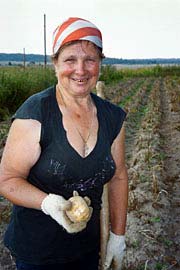Examining a disease decimating global potato yields

Nina Prokhorova, a farmer in Rogachievo, Russia, shows one of her small potatoes from her dacha garden, which has been devastated this year by drought and Colorado potato beetles. Photo: Blaine P. Friedlander Jr./Cornell News Service <br><a target=_blank href=http://www.news.cornell.edu/Utilities/Copyright.html>Copyright © Cornell University </a>
While many Americans will be relaxing after their Thanksgiving Day feast, many people around the world may have a shortage of food, particularly potatoes, a staple that is being seriously threatened by a disease called potato late blight.
In a news story appearing in the journal Science (Nov. 29), “Taking the Bite Out of Blight,” writer Glenn Garelik examines the disease that is affecting potato production globally.
Potato late blight (Phytophthora infestans ) is the pathogen that infested Ireland’s potato fields in the 1840s, considered a major cause of the famine. Scientists had potato late blight under control in the mid-20th century, but in the past three decades late blight has spread around the globe, and the mutated funguslike pathogen has grown more tenacious than ever.
Researchers affiliated with the Cornell Eastern Europe Mexico (CEEM) program headquartered at Cornell University are working to contain the pathogen, which causes brownish or purple-black lesions. The lesions ultimately turn a once-healthy potato plant into black slime, and the tuber itself into mush. An entire field can be wiped out within a week.
In the 1990s, when the blight started seriously affecting Europe again, yields on some Russian plots were slashed by as much as 70 percent. In Russia, where potatoes are a major part of the diet for many people, particularly small-plot farmers, potato blight and other diseases and pests may have dire consequences, says K.V. Raman, executive director of the Cornell potato late blight program, one of the experts cited in the Science story.
“The conditions prevalent in today’s Russia are all too reminiscent of those of Ireland in the mid-19th century,” says Raman.
Media Contact
More Information:
http://www.news.cornell.edu/releases/Nov02/Blight.bpf.htmlAll latest news from the category: Agricultural and Forestry Science
Newest articles

First-of-its-kind study uses remote sensing to monitor plastic debris in rivers and lakes
Remote sensing creates a cost-effective solution to monitoring plastic pollution. A first-of-its-kind study from researchers at the University of Minnesota Twin Cities shows how remote sensing can help monitor and…

Laser-based artificial neuron mimics nerve cell functions at lightning speed
With a processing speed a billion times faster than nature, chip-based laser neuron could help advance AI tasks such as pattern recognition and sequence prediction. Researchers have developed a laser-based…

Optimising the processing of plastic waste
Just one look in the yellow bin reveals a colourful jumble of different types of plastic. However, the purer and more uniform plastic waste is, the easier it is to…



